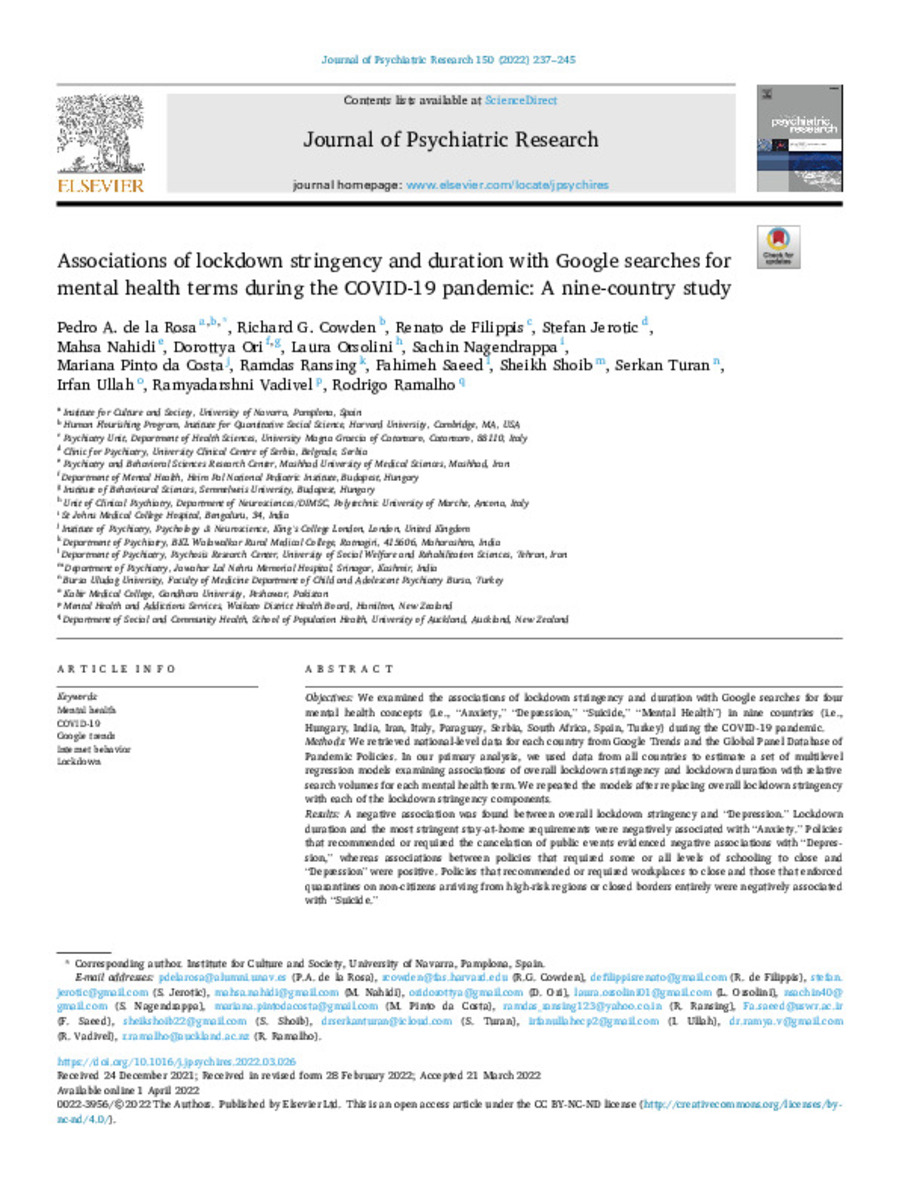Full metadata record
| DC Field | Value | Language |
|---|---|---|
| dc.creator | Rosa, P.A. (Pedro Antonio) de la | - |
| dc.creator | Cowden, R.G. (Richard G.) | - |
| dc.creator | Filippis, R. (Renato) de | - |
| dc.creator | Jerotic, S. (Stefan) | - |
| dc.creator | Nahidi, M. (Mahsa) | - |
| dc.creator | Ori, D. (Dorottya) | - |
| dc.creator | Orsolini, L. (Laura) | - |
| dc.creator | Nagendrappa, S. (Sachin) | - |
| dc.creator | Pinto-da-Costa, M. (Mariana) | - |
| dc.creator | Ransing, R. (Ramdas) | - |
| dc.creator | Saeed, F. (Fahimeh) | - |
| dc.creator | Shoib, S. (Sheikh) | - |
| dc.creator | Turan, S. (Serkan) | - |
| dc.creator | Ullah, I. (Irfan) | - |
| dc.creator | Vadivel, R. (Ramyadarshni) | - |
| dc.creator | Ramalho, R. (Rodrigo) | - |
| dc.date.accessioned | 2023-03-20T11:14:58Z | - |
| dc.date.available | 2023-03-20T11:14:58Z | - |
| dc.date.issued | 2022 | - |
| dc.identifier.citation | De-La-Rosa, P.A. (Pedro Antonio); Cowden, R.G. (Richard G.); Filippis, R. (Renato de); et al. "Associations of lockdown stringency and duration with Google searches for mental health terms during the COVID-19 pandemic: A nine-country study". Journal of Psychiatric Research. 150, 2022, 237 - 245 | es_ES |
| dc.identifier.issn | 1879-1379 | - |
| dc.identifier.uri | https://hdl.handle.net/10171/65741 | - |
| dc.description.abstract | Objectives: We examined the associations of lockdown stringency and duration with Google searches for four mental health concepts (i.e., “Anxiety,” “Depression,” “Suicide,” “Mental Health”) in nine countries (i.e., Hungary, India, Iran, Italy, Paraguay, Serbia, South Africa, Spain, Turkey) during the COVID-19 pandemic. Methods: We retrieved national-level data for each country from Google Trends and the Global Panel Database of Pandemic Policies. In our primary analysis, we used data from all countries to estimate a set of multilevel regression models examining associations of overall lockdown stringency and lockdown duration with relative search volumes for each mental health term. We repeated the models after replacing overall lockdown stringency with each of the lockdown stringency components. Results: A negative association was found between overall lockdown stringency and “Depression.” Lockdown duration and the most stringent stay-at-home requirements were negatively associated with “Anxiety.” Policies that recommended or required the cancelation of public events evidenced negative associations with “Depres- sion,” whereas associations between policies that required some or all levels of schooling to close and “Depression” were positive. Policies that recommended or required workplaces to close and those that enforced quarantines on non-citizens arriving from high-risk regions or closed borders entirely were negatively associated with “Suicide.” | es_ES |
| dc.description.sponsorship | This work was supported by Funciva and Proeduca Summa; and Colegio de Médicos de Navarra (Beca Senior 2020). | es_ES |
| dc.language.iso | eng | es_ES |
| dc.publisher | Elsevier | es_ES |
| dc.rights | info:eu-repo/semantics/openAccess | es_ES |
| dc.subject | Mental health | es_ES |
| dc.subject | COVID-19 | es_ES |
| dc.subject | Google trends | es_ES |
| dc.subject | Internet behavior | es_ES |
| dc.subject | Lockdown | es_ES |
| dc.title | Associations of lockdown stringency and duration with Google searches for mental health terms during the COVID-19 pandemic: A nine-country study | es_ES |
| dc.type | info:eu-repo/semantics/article | es_ES |
| dc.description.note | This is an open access article under the CC BY-NC-ND license | es_ES |
| dc.identifier.doi | 10.1016/j.jpsychires.2022.03.026 | - |
| dadun.citation.endingPage | 245 | es_ES |
| dadun.citation.publicationName | Journal of Psychiatric Research | es_ES |
| dadun.citation.startingPage | 237 | es_ES |
| dadun.citation.volume | 150 | es_ES |
| dc.identifier.pmid | 35398667 | - |
Files in This Item:
Statistics and impact
Items in Dadun are protected by copyright, with all rights reserved, unless otherwise indicated.






